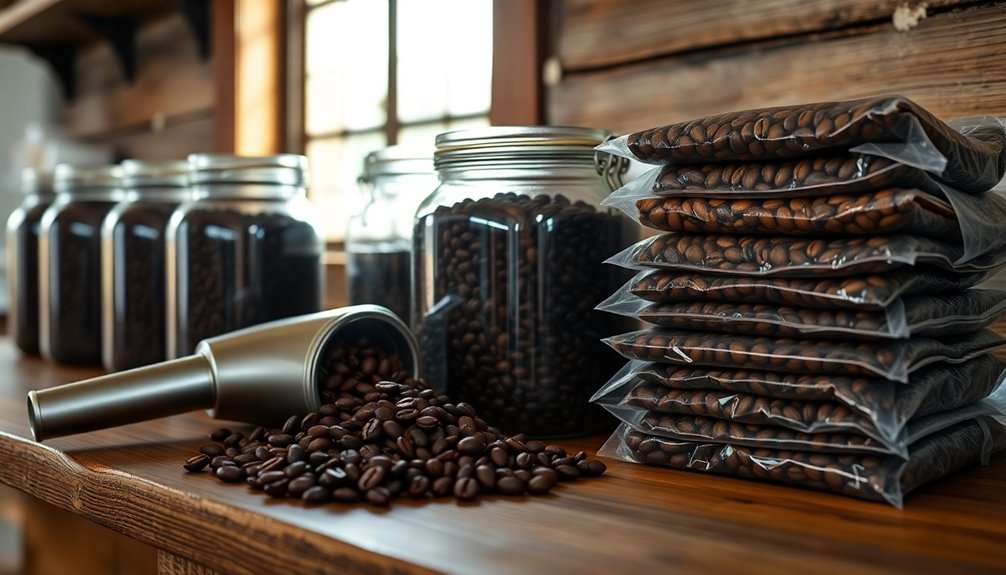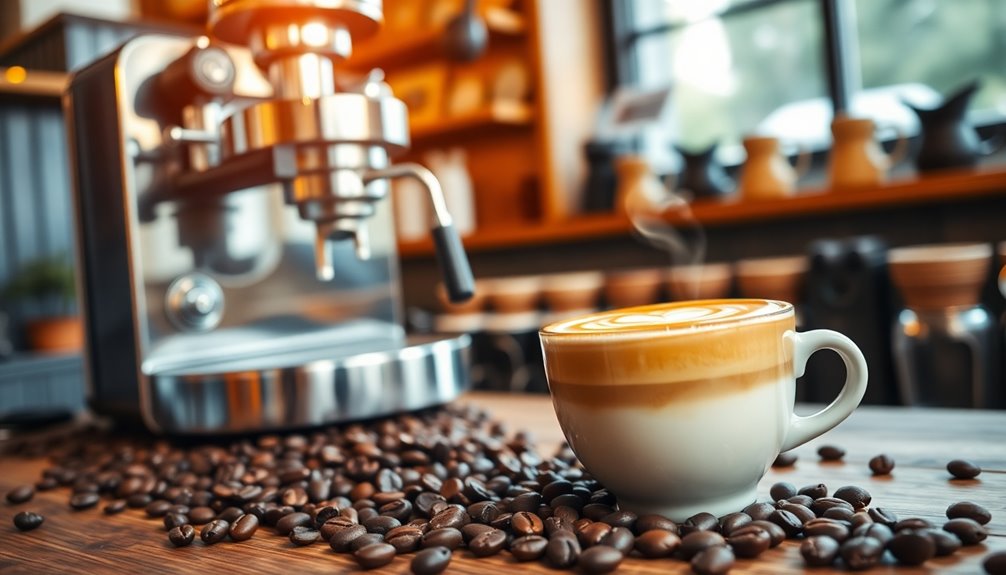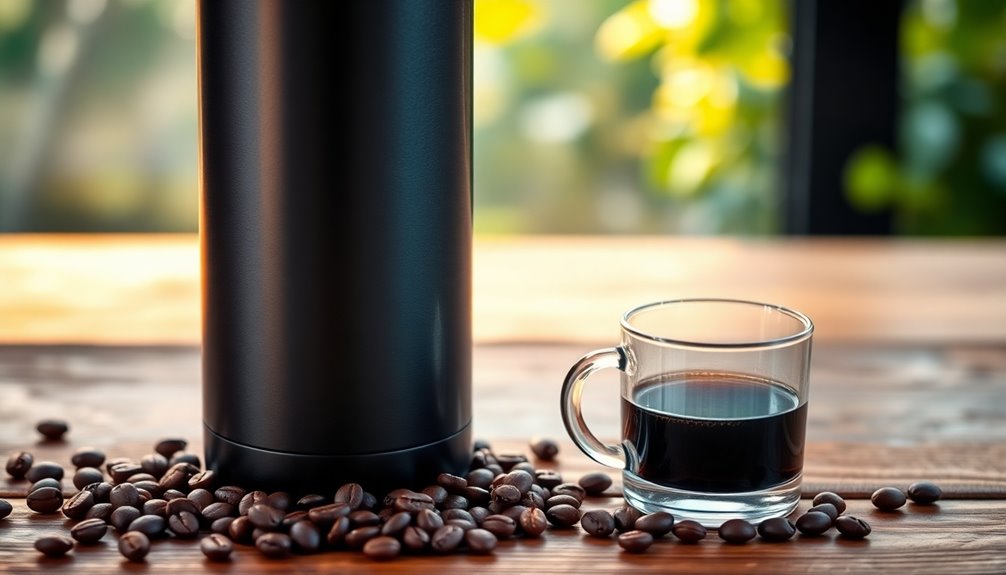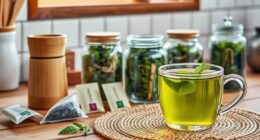To store and freeze coffee beans effectively, you should choose airtight, opaque containers made from materials like BPA-free plastic or stainless steel. Keep them in a cool, dark pantry away from heat and light. For long-term storage, vacuum seal your beans in smaller batches and freeze them at -18ºC; this can preserve freshness for about 90 days. Always wait a week after roasting before freezing, and when you’re ready to use them, let them thaw gradually. By following these steps, you’ll enhance your coffee experience. There’s plenty more to discover about preserving that perfect flavor. When storing coffee beans, it’s important to avoid exposing them to air, moisture, heat, and light, as these elements can degrade the flavor and quality of the coffee. By taking the time to properly store and freeze your coffee beans, you can ensure that they maintain their freshness and flavor for a longer period of time. Experiment with different storage methods and find what works best for you and your coffee preferences.
Key Takeaways
- Use opaque, airtight containers to protect coffee beans from light and air, preserving their flavor and aroma.
- Keep beans in a cool, dark place, maintaining a temperature between 50°F and 70°F for optimal freshness.
- Vacuum seal or divide beans into smaller batches before freezing to minimize oxygen exposure and staling.
- Thaw frozen beans gradually in the refrigerator or at room temperature to prevent moisture buildup.
- Grind coffee beans right before brewing to maximize flavor, ensuring the best taste experience.
Ideal Storage Containers

When it comes to storing coffee beans, choosing the right container is crucial for maintaining freshness and flavor.
Opt for food-safe materials like BPA-free plastic, stainless steel, or opaque glass to prevent contamination and light exposure. Airtight seals are vital; look for containers with tight-fitting lids or silicone seals that keep moisture and temperature fluctuations at bay. Brute containers are designed specifically for this purpose, providing a protective environment against external factors that could compromise the quality of your beans. Maintaining an organized space for your coffee storage can also enhance productivity by minimizing distractions during your coffee preparation routine.
Vacuum technology can also help extend your beans' shelf life. Consider various sizes and stackable options to suit your space and storage needs.
Remember, eco-friendly containers not only keep your beans fresh but also support sustainability.
Lastly, ensure easy maintenance with dishwasher-safe options to keep your storage setup hassle-free.
Short-Term Storage Locations

Finding the right short-term storage location for your coffee beans is essential to preserving their flavor and freshness.
Aim for a pantry or cupboard away from heat sources and direct sunlight. Avoid kitchen counters, as they often expose beans to light and temperature fluctuations. The optimal temperature range for storage is between 50°F and 70°F, where humidity levels should be stable between 50% and 60%. Avoid areas near ovens or stovetops, which can compromise the beans' quality. A climate-controlled environment is ideal, ensuring the beans remain in a dark, stable space.
Using airtight containers for storage can significantly enhance the preservation of your coffee beans' flavor profile.
This careful attention to your storage location will help maintain the unique flavor profile and aroma of your coffee beans for a longer period.
Long-Term Freezing Methods

For those looking to extend the freshness of their coffee beans beyond short-term storage, freezing offers an effective solution.
To achieve optimal results, vacuum seal your beans in airtight bags, as original coffee bags with degassing valves won't cut it. Consider dividing your coffee into smaller batches; this minimizes oxygen exposure each time you take some out. Freezing significantly slows the staling process, with chemical reactions in coffee beans occurring at half the rate for every 10ºC decrease in temperature; this means your beans are better preserved.
Freezing at domestic temperatures (-18ºC) can keep your beans fresh for about 90 days, while commercial freezers (-30 to -40ºC) can extend that to around 237 days. If you freeze coffee right after roasting, it can remain fresh for nearly six years.
Remember to thaw gradually, either in the refrigerator or at room temperature, to avoid moisture buildup and flavor loss.
General Storage Best Practices

To keep your coffee beans fresh and flavorful, focus on proper storage techniques.
Use opaque, airtight containers to shield your beans from light and air. Glass, ceramic, or stainless steel are great choices, while plastic should be avoided due to odor retention. It's important to remember that coffee beans' enemies include air, moisture, heat, light; thus, safeguarding them from these elements is crucial. Additionally, consider diversifying your storage methods to enhance the longevity of your beans.
Store your coffee in a cool, dark place, away from heat sources and strong odors, ideally in a pantry or cupboard.
Buy smaller batches to maintain freshness, and grind your beans just before brewing.
Divide your supply into smaller portions, sealing them tightly after each use to minimize exposure to air.
Always label your containers with the roast date to ensure you enjoy your coffee at its best!
Freezing and Thawing Techniques

Freezing coffee beans can significantly extend their freshness and flavor, but you must follow specific techniques to get it right.
First, always freeze whole beans; ground coffee absorbs moisture and oxygen, causing it to stale faster. Use airtight containers or resealable bags, and consider vacuum sealing to keep air out. Proper storage can help manage off-gassing effects, ensuring that your coffee retains its optimal taste.
Wait 1-2 weeks after roasting to freeze, allowing the beans to degas for optimal flavor.
When it's time to thaw, do so gradually to minimize condensation. Transfer frozen beans to the refrigerator first, then let them sit at room temperature for a few hours.
If you're using single doses, grind them straight from the freezer. For larger batches, let them warm up before opening to keep moisture at bay.
Maintenance and Usage Tips

While maintaining the freshness of your coffee beans is crucial, proper storage and handling are equally important.
Use airtight, opaque containers to limit oxygen and light exposure, and keep them in a cool, dark place away from heat sources. For long-term storage, vacuum-sealed bags work best. Proper storage techniques are crucial for maintaining coffee quality.
Divide your beans into smaller portions to preserve freshness and only grind what you need before brewing. Inspect your storage regularly for signs of moisture or air leaks.
Avoid refrigerating coffee unless it's in an airtight container, as this can introduce moisture. Lastly, keep your coffee away from strong-smelling foods to prevent odor absorption.
Frequently Asked Questions
How Often Should I Replace My Coffee Storage Containers?
You should replace your coffee storage containers every 2-4 weeks to keep your coffee fresh, especially if you're using whole beans.
If you store your coffee in a cool, dark place, it can help maintain flavor longer.
For frequent use, consider replacing containers every 1-2 weeks, dividing your coffee into smaller portions.
Always check for moisture or compromised seals, as these can affect the quality of your coffee.
Can I Store Flavored Coffee Beans Using the Same Methods?
Yes, you can store flavored coffee beans using the same methods as regular coffee.
Just remember to use airtight containers made of glass, ceramic, or stainless steel to prevent odor retention. Keep them in a cool, dark place away from heat and moisture.
If you choose to freeze them, ensure they're vacuum-sealed to maintain their flavor.
Just like regular beans, avoid frequent opening to keep them fresh longer.
What Is the Ideal Temperature for Short-Term Coffee Storage?
For short-term coffee storage, you want to keep it between 50°F to 70°F (10°C to 21°C).
A consistent temperature's key to preventing staling, so avoid areas near heat sources like ovens.
Ideally, store your coffee in a cool, dark pantry or cupboard, away from sunlight.
An opaque, airtight container will help preserve those rich flavors and aromas, ensuring you enjoy fresh coffee every time you brew.
How Long Can Coffee Beans Be Stored in the Freezer?
You can store coffee beans in the freezer for up to six months if you do it properly.
To make the most of their freshness, use airtight containers or vacuum-sealed bags to prevent oxidation. It's best to freeze them at 0°F (-18°C) or lower.
Remember to label and date your containers so you keep track of how long they've been stored.
After thawing, they'll maintain peak freshness for about five to six days.
Does the Type of Coffee Bean Affect Storage Needs?
Yes, the type of coffee bean definitely affects your storage needs.
Darker roasts may need more space and can degas more slowly, influencing how you store them.
Lighter roasts, on the other hand, might be more sensitive to oxidation and require careful handling.
Conclusion
To keep your coffee beans fresh and flavorful, remember to choose the right storage containers and locations. For short-term needs, a cool, dark place works wonders, while freezing is best for long-term storage. When you're ready to enjoy your coffee, use proper thawing techniques to preserve the taste. By following these tips, you'll ensure every cup is as delicious as the last. So go ahead, store your beans wisely and savor that perfect brew!










